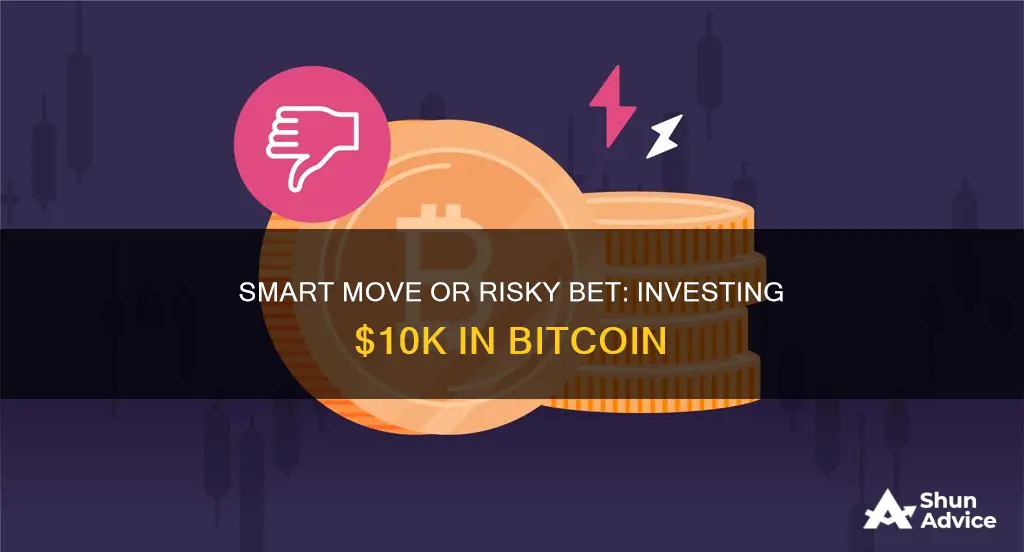
Investing in Bitcoin is a highly debated topic. Some people believe that it is a good investment, while others argue that it is too risky. Bitcoin is a decentralized digital currency, which means there is no central authority, such as a government or bank, controlling it. This makes Bitcoin less susceptible to wild inflation and corrupt banks. However, the price of Bitcoin can be extremely volatile, and it is important to remember that there are risks associated with investing in any cryptocurrency.
What You'll Learn

Bitcoin's value fluctuates, so be prepared to watch your fiat value go up and down
Bitcoin is a volatile asset class, and its value can fluctuate significantly over time. In the past year, its value has ranged from about $25,000 to about $70,000. This volatility is due to the speculative nature of the cryptocurrency industry, where investors bet on Bitcoin's price movements to make profits. As a result, Bitcoin's price can suddenly increase or decrease, leading to unpredictable market behaviour.
Volatility is a measure of the variability of an asset's price over time. A volatile asset like Bitcoin means that its value can substantially increase or decrease in a short period. This volatility also increases the cost of hedging, which is a significant factor in the price of merchant services. If Bitcoin's volatility decreases, the cost of converting into and out of Bitcoin will also decrease.
The Bitcoin Volatility Index (BVIX) tracks Bitcoin's price volatility concerning US dollars. The crypto volatility index (CVI) is a decentralised VIX for cryptocurrency that helps users protect themselves from market volatility and impermanent loss.
When considering investing a substantial sum of money, such as $10,000, in Bitcoin, it is essential to recognise that its value can quickly go up and down. For example, if you invested $10,000 in Bitcoin today, you might see that investment's fiat value increase to $15,000 or decrease to $5,000 in a relatively short period. This volatility is inherent in the nature of Bitcoin and the cryptocurrency market, and it is something that potential investors should be aware of and prepared for.
It is also worth noting that Bitcoin's volatility can be much higher than that of traditional assets like gold and fiat currencies. While gold's volatility averages around 1.2%, and major currencies average between 0.5% and 1.0%, Bitcoin's volatility can be significantly higher, as evidenced by its historical price movements. Therefore, if you are considering investing a significant sum of money in Bitcoin, you should be comfortable with the potential for substantial gains but also prepared for the possibility of significant losses.
Bitcoin or Altcoins: Where Should You Invest?
You may want to see also

Only invest what you can afford to lose
Bitcoin is a decentralised digital currency. It is issued and managed without any central authority, which means there is no government, company, or bank in charge of it. As such, it is more resistant to wild inflation and corrupt banks.
Due to its decentralised nature, Bitcoin is subject to high volatility. Its value has fluctuated wildly since its inception in 2009, shooting to $1,000 in December 2013 and dropping to $19,000 in October 2022.
Given the high risk and volatility associated with Bitcoin, it is generally recommended that individuals should only invest what they can afford to lose. This means not investing money that you don't have on hand or that you may need in the short term. It is important to have an emergency fund and take care of your basic needs before investing in Bitcoin.
By investing only what you can afford to lose, you reduce the potential financial distress and emotional stress that may arise if the value of your investment decreases significantly. It is crucial to understand that investing in Bitcoin is a risky endeavour, and there is always the possibility of losing your entire investment.
Additionally, it is essential to have a long-term investment horizon when investing in Bitcoin. The value of Bitcoin can fluctuate rapidly, and it may take years for it to recover from a downturn. Therefore, if you need immediate access to your funds or cannot afford to lose a significant portion of your investment, it is advisable to avoid investing in Bitcoin or similar high-risk assets.
In conclusion, while Bitcoin offers the potential for significant gains, it is crucial to approach it with caution. By investing only what you can afford to lose, you can mitigate the potential negative consequences of a downturn and maintain a more stable financial position.
Join a Bitcoin Mining Pool: A Step-by-Step Guide
You may want to see also

Understand what Bitcoin is and how it works before investing
Bitcoin is a cryptocurrency, a virtual currency that acts as money and a form of payment outside the control of any one person, group, or entity. It was introduced to the public in 2009 by an anonymous developer or group of developers using the name Satoshi Nakamoto. It is a decentralised digital currency that you can buy, sell and exchange directly, without an intermediary like a bank.
Bitcoin operates without a financial system or government authorities. It can be used as an alternative to fiat currencies or as an investment, utilising peer-to-peer transfers on a digital network that records and secures all transactions. This network is powered by a blockchain, an open-source program that chains transaction histories to prevent manipulation.
A blockchain is a distributed ledger, a shared database of information that is chained together via cryptographic techniques. "Distributed" means that it is stored on many computers rather than on a centralised server, as is typical of data storage. A network of automated programs installed on these computers maintains the blockchain and performs the functions necessary for it to operate.
Bitcoin mining is the process of validating transactions and creating new blocks on the blockchain. Mining is conducted by software applications that run on computers or machines designed specifically for mining, called Application Specific Integrated Circuits. The winning miner is rewarded with bitcoins.
You access your bitcoin using a wallet, a public key, and private keys. Bitcoin users pay transaction fees in bitcoin to miners for processing transactions.
Bitcoin can be purchased on several exchanges, such as Coinbase, Kraken, and Gemini. It can also be bought at online brokers like Robinhood.
Bitcoin: Risky Business or Safe Bet?
You may want to see also

Consider alternative investments, such as blue-chip shares
If you're considering investing 10k in Bitcoin, it's worth noting that it's a risky move. As one source says, "nothing is safe and asking a bunch of Bitcoin-loving Redditors if you should buy is like asking Trump if he thinks he's the best president of all time".
So, what are the alternatives? Well, one option is to consider blue-chip shares. These are stocks from dependable, profitable companies that have stood the test of time. They are well-known, high-quality companies that are industry leaders. Blue-chip companies have solid business models and impressive track records of returns for investors.
Blue-chip stocks are big companies known for being valuable, stable, and established. They are often large-cap stocks, which means they typically have a market valuation of $10 billion or more. These companies have a reliable, solid history of sustained growth and good future prospects. They might not be as flashy as fast-growing tech stocks, but that's because they're already established.
Blue-chip stocks are also popular among investors for their reliability. That doesn't mean they're immune to market downturns, but they've shown a history of weathering these storms and bouncing back. They are also attractive to investors because they tend to pay reliable, growing dividends.
If you're looking for specific examples of blue-chip stocks, here are a few:
- Apple
- Berkshire Hathaway
- Coca-Cola
- Johnson & Johnson
- American Express
- AbbVie
- Nike
- Lockheed Martin
- Honeywell International
- Procter & Gamble
So, if you're thinking of investing 10k, it might be worth considering blue-chip stocks as an alternative to Bitcoin. They can provide a more stable and reliable investment option, although it's important to remember that all investments come with some level of risk.
The Ultimate Guide to Buying Bitcoin Investment Trust
You may want to see also

Seek advice from a financial advisor
Investing in Bitcoin is a risky endeavour. It is a highly volatile asset, and its value is based purely on what people believe it is worth from day to day. There is no central authority that issues and manages Bitcoin, and it is not tied to any country's economy or the gold standard. This means that its value can fluctuate wildly—it could increase or decrease by 80% in a year.
Given the unpredictable nature of Bitcoin, it is always a good idea to seek the advice of a financial advisor before investing. A financial advisor will approach the investment decision from a pragmatic point of view and give you advice that isn't emotionally or behaviourally biased. They can help you understand the risks of investing in this type of asset and outline the possible outcomes.
A financial advisor can also help you answer important questions, such as:
- How much should I invest?
- Where should I buy bitcoins?
- Should I buy a single lump sum or dollar-cost average by purchasing smaller amounts over time?
- What should I do if the price drops or increases significantly?
- How long should I hold my position?
It is important to note that many financial advisors are not well-versed in crypto and may hesitate to recommend it to clients. They may view cryptocurrency as a risky asset that their clients should stay away from unless they have money they can afford to lose. Additionally, the Certified Financial Planner (CFP) Board of Standards has urged advisors to offer cryptocurrency-related advice cautiously, treating these assets with greater scrutiny than conventional financial assets.
However, there are crypto-centric financial advisors who can help guide first-time investors. These advisors may hold blockchain or digital asset certifications, such as the Certificate in Blockchain and Digital Assets (CBDA) or the Certified Digital Asset Advisor (CDAA) credential. They can help investors create and manage a lower-risk crypto portfolio, track trading activities, and prepare taxes effectively.
When seeking the advice of a financial advisor, it is essential to verify their credentials and ask probing questions about blockchain and Bitcoin to ensure they have a good understanding of the crypto landscape.
Bitcoin: Currency or Investment?
You may want to see also
Frequently asked questions
Investing in Bitcoin is risky, and you should only invest money that you can afford to lose. If you are looking for a safe investment, consider other less volatile options.
If you are considering investing 10k in Bitcoin, make sure that you have taken care of all your other finances and that you don't need the money anytime soon.
Unlike traditional currencies, Bitcoin is issued and managed without any central authority. This means that it is more resistant to wild inflation and corrupt banks, and you can be your own bank.







